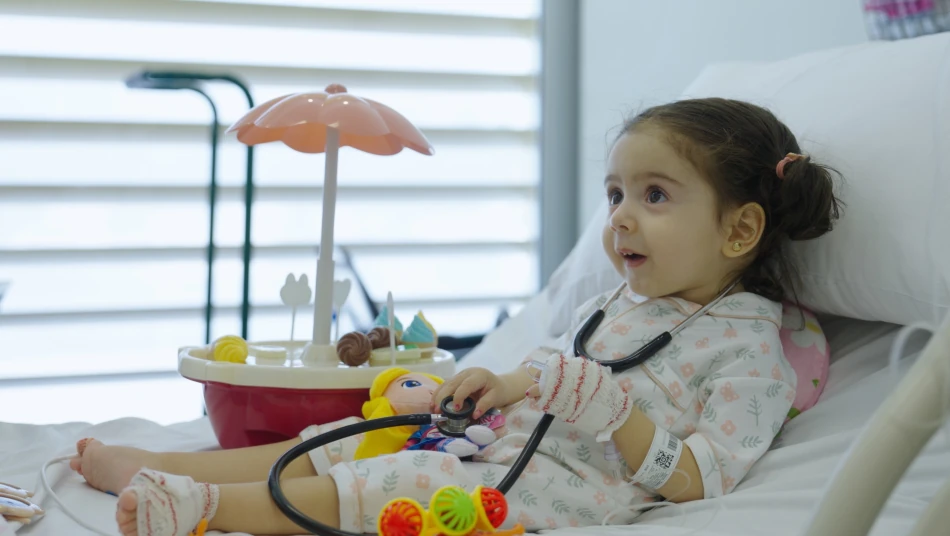
Syrian Girl 'Yaqeen' Receives Groundbreaking Gene Therapy 'Zolgensma' at Dubai's Al Jalila Hospital
Dubai Ruler's $2 Million Medical Intervention Highlights UAE's Growing Role in Advanced Healthcare
A Syrian child with spinal muscular atrophy has received one of the world's most expensive treatments at Dubai's Al Jalila Children's Hospital, after UAE Vice President Sheikh Mohammed bin Rashid Al Maktoum personally covered the $2 million cost. The case underscores Dubai's emergence as a regional hub for cutting-edge medical care and reflects the UAE's broader strategy to position itself as a leader in specialized healthcare services.
Breakthrough Treatment Delivered at Regional Medical Hub
Five-year-old Yaqeen Ibrahim Kanakar received a single intravenous dose of Zolgensma on Friday morning, marking another milestone for Al Jalila Children's Hospital, which has now treated over 100 spinal muscular atrophy cases since 2020. The gene therapy, administered in a one-hour procedure, represents one of the most advanced treatments available for the rare genetic condition that affects motor neurons.
Dr. Haitham Al Bashir, a pediatric rehabilitation consultant at the hospital, emphasized that each case requires individualized treatment protocols. "We adopt an individual approach that takes into account the special needs of each child," he explained, highlighting the hospital's multidisciplinary team approach to complex medical conditions.
Strategic Healthcare Investment Pays Dividends
The hospital's track record of treating 100+ cases over five years positions Dubai as a significant player in rare disease management across the Middle East. This volume suggests the UAE has successfully attracted patients from across the region, potentially generating substantial medical tourism revenue while building expertise in specialized treatments.
Dr. Mohammed Al Awadhi, Executive Director of Women and Children's Health Complex at Dubai Health, noted that the integrated care model covers the entire patient journey from admission through treatment completion, ensuring comprehensive healthcare delivery.
Economic and Strategic Implications
The case highlights several broader trends in regional healthcare development. Dubai's investment in specialized pediatric care mirrors similar strategies in Singapore and other medical tourism destinations, where governments subsidize high-cost treatments to build reputation and attract international patients.
The $2 million treatment cost, while substantial, represents a strategic investment in the UAE's healthcare brand. Such high-profile cases generate significant positive publicity and demonstrate the country's commitment to advanced medical capabilities, potentially attracting wealthy patients who might otherwise seek treatment in Europe or the United States.
Regional Competition and Market Positioning
Dubai's approach contrasts with other Gulf states that have focused primarily on basic healthcare infrastructure. By investing in rare disease treatments and gene therapies, the UAE is carving out a niche in the high-value medical tourism market, where margins are significantly higher than routine medical procedures.
The hospital's ability to handle complex cases like spinal muscular atrophy positions it to compete with established medical centers in countries like Germany and the UK, while offering geographic convenience for Middle Eastern and African patients.
Family's Journey Reflects Broader Regional Dynamics
The emotional testimony from Yaqeen's parents illustrates the human impact of the UAE's healthcare strategy. Father Ibrahim Kanakar expressed overwhelming gratitude, stating he "couldn't sleep from the intensity of joy" and emphasizing that the family felt embraced by the UAE as their own country.
Mother Haifa Abdul Aziz Frouj described the treatment as entering "a stage of real hope," noting that the UAE had become more than just a refuge but a true home for their family during this critical period.
Soft Power and Humanitarian Diplomacy
The personal intervention by Sheikh Mohammed bin Rashid demonstrates how individual acts of generosity can enhance national reputation and soft power influence. Such gestures resonate particularly strongly in the Arab world, where personal leadership and humanitarian values carry significant cultural weight.
This approach to healthcare diplomacy could strengthen the UAE's relationships with neighboring countries and enhance its position as a regional leader in both economic and humanitarian affairs.
Future Implications for Regional Healthcare
The success of this treatment program suggests Dubai will likely expand its rare disease capabilities, potentially attracting pharmaceutical companies to establish regional research and treatment centers. The volume of cases treated indicates sufficient demand to justify continued investment in specialized equipment and expertise.
As gene therapies become more common and new treatments emerge, Dubai's early investment in this sector positions it to capture a growing share of the global medical tourism market, particularly for high-value treatments that require specialized facilities and expertise.
Most Viewed News

 Sara Khaled
Sara Khaled






